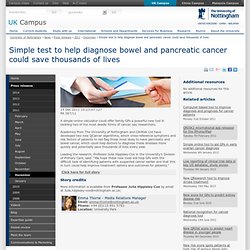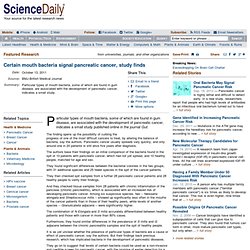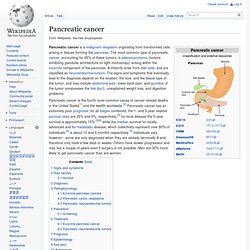

Gene Identified in Increasing Pancreatic Cancer Risk. December 29, 2011Mutations in the ATM gene increase hereditary pancreatic cancer risk.Information could help with risk counseling.Screening methods are undergoing clinical trials. PHILADELPHIA — Mutations in the ATM gene may increase the hereditary risk for pancreatic cancer, according to data published in Cancer Discovery, the newest journal of the American Association for Cancer Research. Pancreatic cancer is one of the most morbid cancers, with less than 5 percent of those diagnosed with the disease surviving to five years. Approximately 10 percent of patients come from families with multiple cases of pancreatic cancer. Klein and colleagues used next-generation sequencing, including whole genome and whole exome analyses, and identified ATM gene mutations in two kindreds with familial pancreatic cancer. Klein said that knowledge of the presence of the ATM gene could lead to better screening for pancreatic cancer, the fourth most common cause of cancer-related death.
Simple test to help diagnose bowel and pancreatic cancer could save thousands of lives. A simple online calculator could offer family GPs a powerful new tool in tackling two of the most deadly forms of cancer, say researchers.

Academics from The University of Nottingham and ClinRisk Ltd have developed two new QCancer algorithms, which cross-reference symptoms and risk factors of patients to red flag those most likely to have pancreatic and bowel cancer, which could help doctors to diagnose these illnesses more quickly and potentially save thousands of lives every year. Leading the research, Professor Julia Hippisley-Cox in the University’s Division of Primary Care, said: “We hope these new tools will help GPs with the difficult task of identifying patients with suspected cancer earlier and that this in turn could help improve treatment options and outcomes for patients.”
Pancreatic cancer, which affects more than 8,000 people in the UK every year, has the worst survival rate for any cancer — almost three-quarters of patients die within a year of diagnosis. . — Ends — Certain mouth bacteria signal pancreatic cancer, study finds. Particular types of mouth bacteria, some of which are found in gum disease, are associated with the development of pancreatic cancer, indicates a small study published online in the journal Gut.

The finding opens up the possibility of curbing the progress of one of the most difficult cancers to treat, by altering the balance of bacteria, say the authors. Pancreatic cancer usually spreads very quickly, and only around one in 20 patients is still alive five years after diagnosis. The authors base their findings on an initial comparison of the bacteria found in the spit of 10 patients with pancreatic cancer, which had not yet spread, and 10 healthy people, matched for age and sex.
They found significant differences between the bacterial colonies in the two groups, with 31 additional species and 25 fewer species in the spit of the cancer patients. They then checked spit samples from a further 28 pancreatic cancer patients and 28 healthy people to verify their findings. Pancreatic cancer. Pancreatic cancer is a malignant neoplasm originating from transformed cells arising in tissues forming the pancreas.

The most common type of pancreatic cancer, accounting for 95% of these tumors, is adenocarcinoma (tumors exhibiting glandular architecture on light microscopy) arising within the exocrine component of the pancreas. A minority arise from islet cells, and are classified as neuroendocrine tumors. The signs and symptoms that eventually lead to the diagnosis depend on the location, the size, and the tissue type of the tumor, and may include abdominal pain, lower back pain, and jaundice (if the tumor compresses the bile duct), unexplained weight loss, and digestive problems. Signs and symptoms[edit] Early pancreatic cancer often does not cause symptoms,[6] and the later symptoms are usually nonspecific and varied.[6] Therefore, pancreatic cancer is often not diagnosed until it is advanced.[6] Common symptoms include: Risk factors[edit] Alcohol[edit] Diagnosis[edit] Prevention[edit]